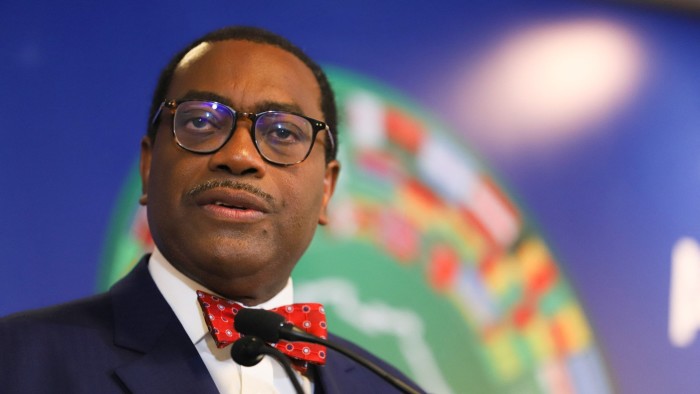Unlock the Editor’s Digest for free
Roula Khalaf, Editor of the FT, selects her favourite stories in this weekly newsletter.
Foreign companies are undervaluing Africa’s natural capital and paying derisory prices for its carbon sequestration, the head of the continent’s biggest development bank told the Financial Times.
“We used to have land grabs. Now we are having carbon grabs,” Akinwumi Adesina, the president of the African Development Bank, said of what he described as low prices paid for African carbon credits.
“The cost of getting permits in Europe probably can be as high as €200 a tonne,” he said. “Or you can go get it in Africa for $3. Countries are losing vast areas of forest, vast areas of land, to what I call a carbon grab.”
Adesina, who is leaving after 10 years at the bank in September, did not name specific companies. But several companies trade African carbon linked to avoiding deforestation, for example through cookstove schemes meant to reduce emissions by enabling consumers to make meals without using firewood. Some of those schemes have been questioned or discredited, driving the price of credits down.
Data from MSCI Carbon Markets show the price of a credit representing a tonne of CO₂ averaged $4.80 last year, down from $6 the year before, with a premium for projects that removed the greenhouse gas from the atmosphere. Some western developers claim to store CO₂ underground semi-permanently, issuing much more expensive credits.
“We have not seen one cent from the carbon we are absorbing from the forests,” Rudolph Merab, a former timber baron who is head of Liberia’s Forestry Development Authority, told the FT. He complained of being offered just $1 per tonne of CO₂ stored in the west African nation’s forests.
Adesina also said Africa should revamp the way its GDP was calculated with more account taken of its natural capital. If properly measured, he said, it could allow countries to borrow more at more reasonable rates.
“We have oil, gas, minerals, metals. We have biodiversity, we have carbon, we’ve got all these things that are vital for Africa’s development. They’re running to trillions of dollars, but none of these are actually put into the computation of Africa’s GDP.”
Africa also needed to make full use of its hydrocarbon resources, and must not be “ideological” about renewable energy, the bank chief said. It would be up to his successor to decide whether the bank, whose current rules prevent it from financing upstream oil and gas exploration, should loosen investment criteria.
“Africa cannot be sitting on massive resources and [remain] poor,” he said. “For me, it’s not negotiable. Africa doesn’t have access to electricity and yet is not allowed to use its gas,” he said, referring to financial restrictions by many banks and global institutions on gas projects.
Adesina, speaking the day before President Donald Trump unleashed a barrage of tariffs, said the continent must adapt to a world with more trade friction and less aid by deploying finance more efficiently. He said he did not believe Africa was “under attack from the US government”, but added Africa had to adopt new strategies.
“You don’t control what happens, but you must certainly control your response,” he said. “It’s just like a pilot [who] runs into turbulence. You don’t fly into the turbulence, you’ve got to navigate around it.”
The Abidjan-based bank has access to authorised capital of more than $300bn, which is available to be disbursed to infrastructure, power, agriculture and other projects.
The sharp reduction of aid from the US and Europe should be a call to action, he said. “I can’t take your benevolence and put it on my balance sheet. Africa is not going to beg its way to development. It has to do so by trade and investment.”
Former UK prime minister Tony Blair, whose eponymous Institute for Global Change advises 20 African countries, and who met Adesina in London this week said that the west should shift dwindling aid towards longer-term development.
“There’s an opportunity, if the west wants . . . to deal with issues that really solve some of the structural problems that African economies have, rather than large-scale palliative projects which are important because they save lives but in the long term don’t really impact the structural change necessary,” he said.
Adesina agreed with Blair that Africa needed to tackle high debt levels and said the AfDB was supporting the establishment of an African Financing Stability Mechanism that would “provide debt refinancing support to illiquid African governments at risk of debt distress”.
He also said the AfDB had made scarce capital stretch further through deals with private investors to move the risk of some of its loans off the bank’s balance sheet.
The continent, he said, had to attract more capital, though he also said it should continue to advocate for structural changes to an international financial system that overpriced African risk. He supported the proposal for an African rating agency that could provide a counter-argument to Moody’s, S&P Global Ratings and Fitch, which, he said “don’t have the right methodologies [or] the right assessment of Africa’s risk profiles”.
Elections to replace Adesina will take place at the bank’s annual meeting in Abidjan in May.
Climate Capital

Where climate change meets business, markets and politics. Explore the FT’s coverage here.
Are you curious about the FT’s environmental sustainability commitments? Find out more about our science-based targets here




